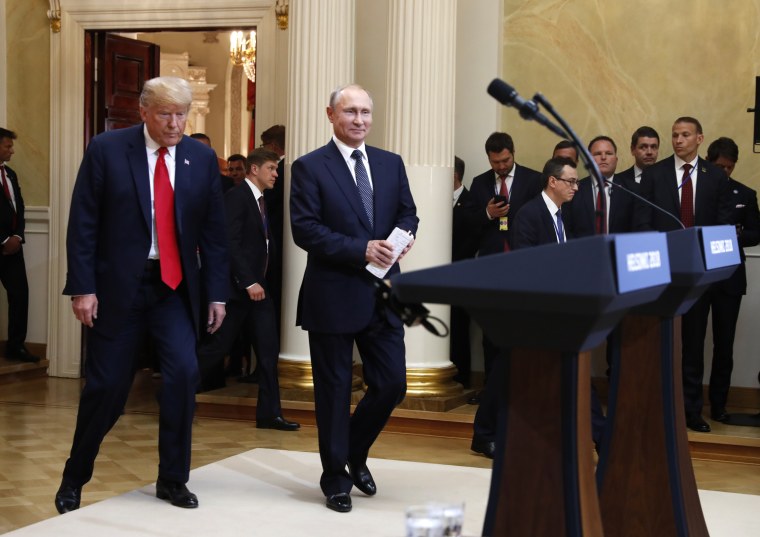Throughout his presidency, Donald Trump has had multiple opportunities to confront Russian President Vladimir Putin on Moscow's military intelligence operation targeting American elections. Throughout his presidency, for reasons the White House hasn't even tried to explain, Trump has refused.
The problem is even more acute now. Special Counsel Robert Mueller's report just told the American president, and the rest of the world, "The Russian government interfered in the 2016 presidential election in sweeping and systematic fashion." Soon after, Trump's handpicked FBI director, Christopher Wray, gave sworn congressional testimony in which he described Russian efforts to interfere in American elections as a "significant counterintelligence threat."
It was against this backdrop that Trump had a lengthy phone call with Putin on Friday, creating a new opportunity for the Republican to stick up for his own country, demand accountability, and warn the autocratic leader not to target us again. Would Trump step up?
White House Press Secretary Sarah Huckabee Sanders told reporters that the two presidents spoke about the resolution of the Mueller investigation, but when a reporter asked whether Trump broached the subject of Russia's attack, she dodged.
Her boss, however, removed all doubt.
Q: Did you tell [Putin] not to meddle in the next election?TRUMP: We didn't discuss that. Really, we didn't discuss it.
I especially liked the use of the word "really," as if the Republican was eager to convince everyone that he wasn't peddling a dubious line: Trump "really" didn't bother to tell our attacker not to do it again.
In other words, even after the American president was confronted with definitive evidence that Russia attacked us -- the Trump campaign now accepts this as fact -- he still has no interest in holding the Russian president accountable or demanding that Moscow back off ahead of 2020.
It's hard to say why, exactly, the Republican is so timid. Maybe Trump still doesn't believe his own country's intelligence. Maybe he's been compromised in some way by his Russian benefactor. Maybe he assumes Russian election interference will benefit him and his party, so there's no reason to press the issue.
Whatever the reasoning, Trump's weakness is pitiful.
In fact, even some of the president's most loyal allies have struggled to come up with an explanation for the American president's cowardice. On "Face the Nation" yesterday, CBS News' Margaret Brennan asked Secretary of State Mike Pompeo, "Why didn't he bring up election interference on this phone call when he said he did discuss the findings of the Mueller report which found 'sweeping and systematic' Russian interference in 2016?"
Pompeo responded, "Well, you'll have to ask the White House that question."
The cabinet secretary had two days to think of an answer to this fairly obvious question, which he must've known was coming. Apparently, this was the best he could come up with.
Postscript: For the record, it's worth taking a moment to acknowledge the fact that Trump spoke with Vladimir Putin about the Mueller investigation, but Trump refused to speak with Mueller about the Mueller investigation.
